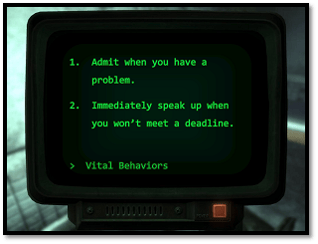 Let's say you work as a manager in a software development firm where dozens of software engineers write mountains of code every week. The products are so complex that the overall design is divided among several teams. After years of your employees bringing in projects late or riddled with bugs, you discover that the key to consistent high-quality performance is getting them to practice two vital behaviors: (1) admit when they have problems, and (2) immediately speak up when they won't meet a deadline. When your software designers do these two things consistently, products get completed correctly and on time. When they don't, they don't.
Let's say you work as a manager in a software development firm where dozens of software engineers write mountains of code every week. The products are so complex that the overall design is divided among several teams. After years of your employees bringing in projects late or riddled with bugs, you discover that the key to consistent high-quality performance is getting them to practice two vital behaviors: (1) admit when they have problems, and (2) immediately speak up when they won't meet a deadline. When your software designers do these two things consistently, products get completed correctly and on time. When they don't, they don't.
-Grenny, Patterson, Maxfield, McMillan, and Switzler, Influencer
If we were to guess what would make a group of programmers successful, our most likely answers would be of a technical nature: knowledge of the coding language, ability to think logically, experience working on similar projects, and so on. Instead, the case study above (which is of an actual software development firm the authors interviewed) shows that while those things are certainly important, there may be bigger-picture behaviors that we are overlooking that can make or break our projects. Both of the vital behaviors above have nothing specific to do with software development, but are instead about time management and communication. Do these same vital behaviors apply to you and your team? Quite possibly, especially with teams that work autonomously at least some of the time. What other outside-the-box behaviors are critical for you? Try setting a timer for 3 to 5 minutes are listing as many behaviors as you can think of that are vital to your work.
Additionally, the authors are telling us with their case study that the number of vital behaviors should be small: it shouldn't be more than a few items. While there are hundreds of things that a software development firm has to do to complete each project, the closer we get to identifying the true vital behaviors, the fewer there are. Revisit the list of behaviors you brainstormed and evaluate which are the most critical. Often, these behaviors, when done consistently, "take care of" many of the lower-level behaviors you probably have listed. With this in mind, it's much easier to narrow the list down significantly and make it easier to implement. A list of 40 crucial steps to success will rarely be followable, whereas a simple and straightforward list of 2 - 4 behaviors to complete is much more manageable.


